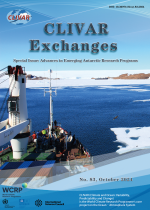The Sources and Sinks of Ocean Mesoscale Eddy Energy. A Joint US CLIVAR and CLIVAR Workshop Report is now available, summarizing a March 2019 workshop on advancing our understanding of ocean mesoscale eddies and their energy sources and sinks in the context of climate variability and change. Also included in the report include recommendations and next steps presented by the workshop...
News
The development of the 1997 event appears influenced by the conditions in the Atlantic during boreal summer. The representation of this interaction and that with the Indian Ocean is thought important for predictability in the tropics. Data HadISST.
After an open call to receive proposals for new Research Foci, CLIVAR received five outstanding...
Jose Santos, Executive Director of the ICPO attended the “2019 Indian Ocean Workshop: What to do”, held in Hangzhou, China; organized by the Indian Ocean Operational Oceanographic Research Center, and with the support of the Second Institute of Oceanography.
The objectives of the workshop were:
- To exchange results of recent research activities, and coordination and...
We would like to appoint Ms Zhao, Qian as the administrative assistant of International CLIVAR Project Office
Duties and responsibilities of the ICPO Administrative Assistant
The ICPO administrative assistant assists the Executive Director and Staff Scientists to ensure that the ICPO provides effective secretarial support to the CLIVAR Scientific Steering Group (...
The International CLIVAR Project Office (ICPO) was invited to attend the No. 244 Shuangqing Forum on 'Physical and Biogeochemical Processes and their Interaction in the Indian Ocean under the Global Changes',...
Dr Rupa Kumar Kolli has recently taken charge as the Executive Director of the International CLIVAR Monsoon Project Office (ICMPO), hosted by the Indian Institute of Tropical Meteorology (IITM), Pune, India. Prior to this, he had served for 13 years (2006-2019) at the WMO Secretariat, Geneva, Switzerland as the Chief of World Climate Applications and Services Division. His responsibilities at...
Group photo of PRP-14
The 14th Session of CLIVAR Pacific Region Panel (PRP) took place on 19 October 2019, in Victoria, Canada, alongside the 2019 PICES Annual Meeting. During the meeting, updates on in 2018-2019 panel activities have been summarized, including progresses on ENSO Conceptual Models and ENSO Metrics working groups,...
In June 2019, the PICES Working Group-40 (Climate and Ecosystem Predictability) met at the First Institute of Oceanography (FIO) in Qingdao, China for a two-and-a-half-day intersessional workshop at the invitation of Dr. Fangli Qiao. The main objective of WG-40 is “to identify, diagnose and quantify predictable responses in North Pacific marine ecosystems that...
Jose Santos, Executive Director of the International CLIVAR Project office, participated at the World Marine Science and Technology Conference held from 23rd to 26th September in Qingdao, Shandong province; hosted by the Shandong Association for Science and Technology and the Qingdao Municipal Government; and organized by the Qingdao Association for Science and Technology, and the Institute...
The OceanObs' 19 was held on September 16-20, 2019 at Honolulu, Hawaii, USA. With the efforts of SSG and all panels and research foci, CLIVAR submitted 10 white papers to contribute to the conference as well as the global ocean observing system.
During the conference, the Executive Summary of the IndOOS Decadal Review has been distributed by IORP with support of the ICPO, and a poster...
On 5-6 September 2019, the ICPO staff participated in the East Asia Marine Environment Cooperation Forum and Workshop on UN Decade of Ocean Science for Sustainable development, sponsored by Qingdao Municipal People’s Government and IOC Sub-Commission for the Western Pacific (IOC-WESTPAC), and organised by First Institute of Oceanography, Ministry of Natural...
The OceanObs' 19 will be held on September 16-20, 2019 at Honolulu, Hawaii, USA. OceanObs’19 seeks to improve response to scientific and societal needs of a fit-for-purpose integrated ocean observing system, for better understanding the environment of the Earth, monitoring climate, and informing adaptation strategies as well as the sustainable use of ocean resources....
Figure Observational ocean heat content changes for the upper 2000 m from in situ observations in Domingues et al. (2008), Cheng et al. (2017), and Ishii et al. (2017), compared with the ensemble means of the CMIP5 models for historical simulations pre-2005 and projections after 2005. Model calculations performed for emissions projections RCP2.6,...
CLIVAR (http://www.clivar.org/) is a Core Project of the World Climate Research Progamme (http://www.wcrp-climate.org/) dedicated to understanding the role of the oceans in the variability, predictability and change of climate. Each of the Core Projects has an International Project Office that acts as an extension...
The significant role of the Southern Ocean on the Earth System has been realized and caused for global concern. For the Over the last decade, the Southern Ocean Observing System (SOOS) has established networks for enhancing regional coordination and research community groups to advance development of observing system capabilities and achieved wonderful outcome...



























